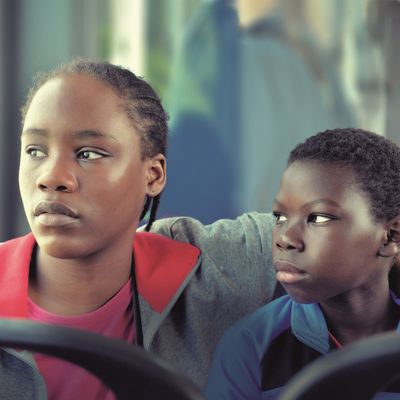
For the last several decades, Belgian filmmakers Jean-Pierre and Luc Dardenne have made compact, compassionate, ground-level social dramas about Europe’s dispossessed and been garlanded with prizes along the way (including two Palmes d’Or at Cannes). Their films emerge from a wealth of in-depth research into a chosen topic along with a long rehearsal period for their performers, who are often nonprofessionals or newcomers. (Occasionally, they’ll work with a more established actor — as they did with Marion Cotillard in 2014’s Two Days, One Night, for which she received an Oscar nomination.) For all the sensitivity and sobriety of their work, however, what has made the Dardennes such effective filmmakers has been the subtle way they insert genre elements into their dramas. Each movie could be thought of as a thriller — often involving characters racing against the clock, entering places they mustn’t, or crossing people they shouldn’t. The unhinged handheld camerawork often matches the frantic events onscreen. Watching a Dardennes film, your heart races, then it breaks.
Tori and Lokita, the directors’ latest (and winner of the Cannes 75th Anniversary prize last year), opens in somewhat uncharacteristic fashion with a steady, mesmerizing close-up of 17-year-old African migrant Lokita (Joely Mbundu) as she answers the prying questions of an offscreen interrogator. These are not simply informational queries. The bureaucrat asking them clearly wants to catch Lokita in a lie. They ask about her 11-year-old brother, Tori (Pablo Schils), and how she reunited with him in an orphanage. They ask her to identify the lake near which she grew up and the name of a teacher. Calm and collected at first, Lokita struggles to keep herself together. Finally, she starts to cry, unable to go on. Maybe that’s when we realize that she is, in fact, lying.
Tori and Lokita are not actually brother and sister. They’re not even from the same country. (One is from Benin, the other from Cameroon.) But they’ve formed an almost mystically strong bond ever since they met during their crossing to Europe and have now become inseparable. Like many a Dardennes protagonist, they are endlessly resourceful and almost always in motion. They work for pennies at an Italian restaurant, singing songs for the customers, then dealing drugs all over the city for the Albanian chef and owner (Alban Ukaj, one of the stars of the Dardennes’ 2008 masterpiece, Lorna’s Silence). The money they make goes to Lokita’s family back home and to the smugglers that brought them here. But they need papers: Tori has been accepted as a refugee, but Lokita needs to prove that she is related to him in order to legally remain in Belgium.
The Dardennes don’t like to fill in a lot of details when it comes to their characters. They often rely on the performers to help shade in these people’s psychologies. Here, the deployment of narrative information seems even more cursory than usual. But the two young actors convey, sometimes through movement alone, complex inner lives. For all of his grown-up sense of responsibility, Tori is still just a child, and he has a child’s natural optimism. He thinks he can get out of any scrape, cross any boundary, solve any problem. Lokita, by contrast, has already been beaten down so much that the anxiety attacks she regularly suffers from (and takes medication for) seem less like an inborn condition and more a response to the reality around her. The girl seems exhausted so much of the time, even though she, like Tori, has to keep moving.
These two kids are surrounded by cruelty, indifference, and suspicion. The cops and bureaucrats don’t trust them. They’re practically invisible to the hipsters, bouncers, pensioners, and middle-class couples they sell weed to. The smugglers they owe — ostensibly a church group — are basically shakedown artists. Their supposed employer almost never looks at them, even when he takes sexual advantage of Lokita. Perhaps these are some of the reasons why Tori and Lokita are so bound to one another. Their world seems otherwise empty of humanity and warmth. When Lokita finds herself forced to eat a meal apart from Tori, she pulls up a picture of him on her phone to keep her company.
The Dardennes’ camerawork seems more restrained than usual this time. Is it because the shaky, pseudo-vérité style that was their hallmark lost its allure in recent years — thanks primarily to its overuse in Hollywood action flicks? Or is it because we need to see Tori and Lokita’s faces more clearly, to register the tenderness between them? Such softness is rare for these filmmakers, whose characters tend to have cooler, transactional relationships.
The connection between Tori and Lokita allows us to feel some hope — and it means that the film becomes ulcer-inducingly unbearable once things truly start to spin out of control. Suspense and concern for the characters, of course, are a good thing, but this is where Tori and Lokita falters somewhat. It feels abbreviated, ending rather abruptly, as if the Dardennes wanted to note the callousness of this world through the film’s form and structure. That might be true, but it feels like an easy way out. Tori and Lokita is a film born of rage and frustration, and as such, it’s a moving one. But it’s fair to expect more than just rage from artists — especially our greatest and most empathetic ones.
More Movie Reviews
- The Thriller Drop Is a Perfect Addition to the Bad-First-Date Canon
- The Accountant 2 Can Not Be Taken Seriously
- Another Simple Favor Is So Fun, Until It Gets So Dumb


